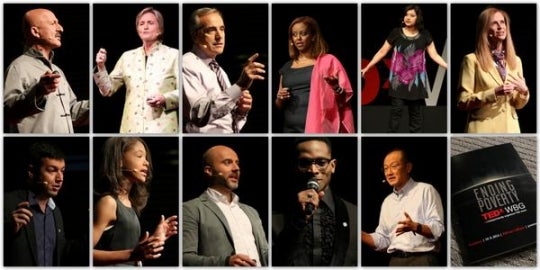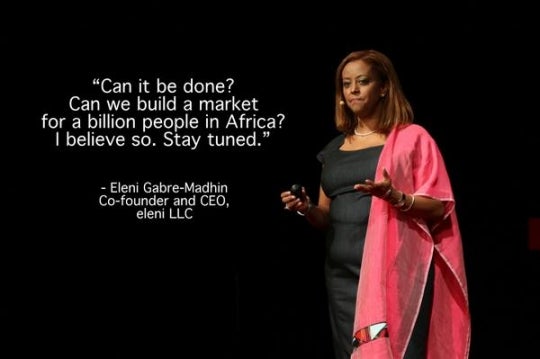
Nigerian singer, D’banj had the audience on its feet, with iPhones flashing photos, hips swaying and arms waving, as he sang his hit single “Top of the World” at the first TEDx WBG.
D’banj is not only an international superstar with multiple music awards to his credit. He has also used his celebrity to garner over 2 million signatures for the Do Agric Global Africa Campaign and was recently appointed Nigeria’s first UN Youth Ambassador for Peace.

D’banj was joined on stage Thursday in the Preston Auditorium by other artists, thinkers and doers from around the world, who explored the theme of “Ending Poverty.” The tightly choreographed 3.5-hour event was moderated by Tumi Makgabo, executive director for AfricaWorldwide Media and a broadcaster for CNN International.
TEDx WBG was divided into three distinct sessions: “Reaching the Excluded” delved into the questions of who the poor are; where they live and how can we reach them? “Scaling Up for Impact” looked at inventive ways innovators have solved challenges and taken their ideas to scale. “Transformation and Innovation” showcased ways people are transforming their societies.
“Reaching the Excluded” featured photojournalist REZA, President and CEO of BRAC USA, Susan Davis, and Marcelo Giugale, senior director of the Macroeconomics and Fiscal Management Global Practice at the World Bank Group.
Davis told the audience about the story of Rupa, a young girl who was married off by her family at the age of 13 and widowed with a child two years later. Today, she is a “barefoot lawyer” teaching and leading “other women just like her in their own process of transformation.”
Every three seconds someone dies, many of them children, of extreme poverty, Davis said. But, she argued, “we know enough, are rich enough and together we are powerful enough” to partner to end global poverty.
In his talk, Giugale said that development experts used to think of the poor as one amorphous group. Today, “we are on our way to knowing the poor individually, one-by-one,” he said. In Mexico, when conditional cash transfers were introduced, the media joked that it should be called “cerveza,” or “beer,” rather than “Progresa,” because it was thought the poor would simply drink away the money they were given by the government. Instead, they used the money to help lift their families out of poverty. Currently 70 developing countries, half of them in Africa, use such cash transfers for health, education and other basic needs.
“Scaling Up for Impact” showcased Eleni Gabre-Madhin, co-founder and CEO of eleni LLC, Shelly Batra, co-founder and president of Operation ASHA, Claudia Costin, senior director of the Education Global Practice and Rafael Parente, director of LABi.
Gabre-Madhin described her company’s work with Ethiopian farmers to tap into the “information explosion” of global and regional markets. These farmers worked the land near the Sudanese-Eritrean border. Toting AK-47s, they were dubious of her claims that they could get their money a day after their crops were sold.

Gabre-Madhin said she would never forget the sight of the head of the cooperative holding up the bank print-out showing their newly deposited funds, greeted by the laughing, clapping and ululating farmers. They had found a “market that they could trust,” she said. The NGO today works with farmers in Kenya, Ghana, Tanzania and Cameroon to get them top prices for their crops.
“Transformation and Innovation” rounded off the program with poet Christin Clyburn, Jeff Risom, managing director of Gehl Studio, D’banj and Bank Group President Jim Yong Kim.

Twelve-year-old Clyburn received a standing ovation for her incredible poem “Nowhere to Go,” winner of the 2014 River of Words Anacostia Watershed Prize from “River of Words.”
She was followed by architectural engineer Jeff Risom who talked about “putting people in the center” of design in urban planning. He gave the example of New York’s Times Square, which used to only have 11 percent dedicated to pedestrian traffic. The area has been transformed by a walkway that stretches from Central Park to Union Square in downtown Manhattan. “Understanding the needs and patterns of people” has also made it possible for cars to move more freely, making the area better for all, he said.
Following D’banj’s pulsing performance, President Kim ended the program with his inspiring public health work combatting drug-resistant tuberculosis in Peru and HIV treatment, first in Haiti, and then Africa.
Kim said that HIV treatment to the 25 million infected by HIV in Africa seemed an insurmountable task. “They’re all dead,” some experts told him. “We were suffering from low aspirations,” the president said. Today, 10 million people are being treated for HIV in Africa.
Aspiring high is what is needed to achieve ending poverty by 2030 because the “last 6 percent” will be the hardest to reach, Kim said. Three things are needed: inclusive economic growth, investing in people and sharing knowledge and solutions to areas that need them across the globe.


Join the Conversation